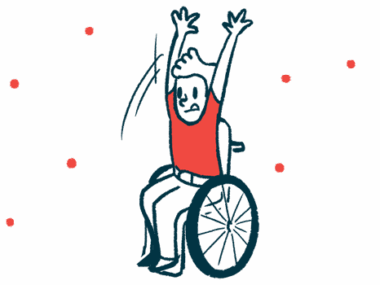According to Spotify Wrapped, I’m Allergic to Silence
For columnist Kevin Schaefer, listening to music offers a number of benefits
Written by |

I listened to 78,978 minutes of music and podcasts in 2022. Thanks to the popular feature Spotify Wrapped, I and millions of users can look at a summary of our listening habits each year, for better or worse. Some may find my avid consumption of pop albums and Broadway show tunes healthy and therapeutic, while others might wonder if my brain is still functioning amid the perpetual noise.
Last year for Christmas, my parents got me a pair of Beats Studio headphones. I was excited to find ones that actually fit around my disproportionately large head and didn’t fall off every five minutes. For the longest time, I could never find a model that would stay on and not need constant readjusting. It was especially difficult in my pre-Spinraza (nusinersen) days, when my balance was so off that I moved like a human bobblehead.
Receiving those perfectly sized headphones opened new doors for me. Before, I’d listen to music either through my phone or my Amazon Alexa speaker, but I was missing that immersive connection. Now I can get lost in whatever I’m listening to, as well as eliminate background noise when I’m recording a podcast or on a Zoom call.
Some prefer silence when they’re trying to focus on a task, but I love to play music while I’m working or writing. I even created a writing playlist this year and kept it on repeat while I wrote a draft of a play. The rhythm and composition of each song pushed me to keep going.
On days when my physical decline from SMA is more apparent and my fatigue reaches its peak, listening to something is one of the most accessible activities for me. As much as I love reading, it’s become increasingly more difficult for me to turn pages. And there are days when I’m too tired from looking at my computer screen all day to read digitally. Yet I still want something that’s relaxing and mentally stimulating.
It’s in these instances that I turn to Spotify for my abundant library of music, podcasts, and comedy albums. I might start the day with a mix of musical and movie soundtrack hits and go to bed with an indie record. In between, my podcasts range from human interest conversations and writer interviews to retrospective shows about my favorite sitcoms. On any given day, I might listen to Taylor Swift, Lin-Manuel Miranda, Michael Giacchino, a “Lord of the Rings” podcast, Sam Cooke, and the Avett Brothers, all in the span of 12 hours.

A summary of my musical tastes. (Courtesy of Kevin Schaefer)
Back in October when I was sick, my dad and I spent about seven hours in different waiting areas of the hospital’s emergency department. As I sat in the room with only a bed next to me and some above-average hospital food, I had little else to do than to contemplate my exhaustion and hope for the antibiotics that were flowing through me to kick in. Sometimes silence is necessary and even comforting. At that moment, not so much.
I asked my dad to get my headphones out of my backpack and put them on me, as well as adjust my hand so I could reach my phone. From there I immersed myself in the music of HAIM, one of my favorite bands. In one of the more stressful times of the past year, music provided me with an escape. To quote from one of their songs, I did not find it in silence.
Now, I’d like to use this opportunity to request VIP backstage passes for the next HAIM tour.
Note: SMA News Today is strictly a news and information website about the disease. It does not provide medical advice, diagnosis, or treatment. This content is not intended to be a substitute for professional medical advice, diagnosis, or treatment. Always seek the advice of your physician or other qualified health provider with any questions you may have regarding a medical condition. Never disregard professional medical advice or delay in seeking it because of something you have read on this website. The opinions expressed in this column are not those of SMA News Today or its parent company, Bionews, and are intended to spark discussion about issues pertaining to spinal muscular atrophy.





Leave a comment
Fill in the required fields to post. Your email address will not be published.